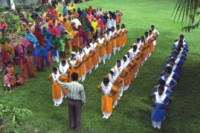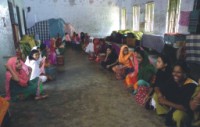|
Endeavour

Moon Moon Sultana
 |
Exercise is part of the daily routine at the home. |
Now about 26 years old, Brishti fled away from home when she was only 12 and a student of Class III, after a family quarrel over a trivial matter. Brishti is not her real name; she says, "As soon as I stepped out of the bus, the police caught me and took me to the police station. When the officer-in-charge (OC) asked my name I didn't reveal my name fearing they would send me back home. It was raining then and the OC named me Brishti. Since then I am Brishti and no longer Rehana," she adds. The police sent her to a government shelter home in Mirpur and soon she became quite settled at Kashimpur Sarkeri Asroy Kendra in Gazipur after the authority declared her a 'vagrant'. Like Brishti or Rehana, 200 other vagrant children and women aged between 2 to 30 and 15 to 25 years old live in the Kashimpur shelter home.
Brishti, now, can only remember that she once had a mother and five siblings but she does not want to go back to her home as she is happy and feels safe in this home. The home authority has trained her in embroidery and general sewing skills that may help her to earn money and spend according to her wish.
Three years ago, she along with her 30 mates were recruited at a nearby garment factory as part of a rehabilitation programme of the Kashimpur home. However, a few months later two of the mates lured her to Dhaka with the promise of a better job.
"We escaped from the garment factory and went to Dhaka where my mates whom I considered close friends got me a job of doing 'bad work' at a hotel," says Brishti. Eventually, she left this job and went back to the shelter home, which was the only place she felt safe.
Like Brishti, other residents, who are being trained in different skills such as basic sewing and embroidery from the centre, show an obvious reluctance to go beyond the boundary of the around six-acre-centre.
 Established in 1977, the vagrant home's main objective was to provide shelter to the homeless and a chance to develop a positive, creative and regular life. But the rehabilitation of these people is not an easy task-- as the officials running the home have realised. Dewan Abdul Awal, manager of the Kendra says lack of proper manpower such as a counsellor and case history worker remain as obstacles for the smooth running of the activities of the centre endorsing its residents' reintegration into society. Around nine posts of the centre including Assistant Manager, part-time Doctor, Religion teacher, Trade Instructor (general sewing) and five posts of guard out of ten are vacant at present, he adds. When asked about the vacant posts Rawshan Ara Begum, deputy director (Vagrant Homes) of the Department of Social Services says the process of filling up the vacant posts is underway in the ministry. Established in 1977, the vagrant home's main objective was to provide shelter to the homeless and a chance to develop a positive, creative and regular life. But the rehabilitation of these people is not an easy task-- as the officials running the home have realised. Dewan Abdul Awal, manager of the Kendra says lack of proper manpower such as a counsellor and case history worker remain as obstacles for the smooth running of the activities of the centre endorsing its residents' reintegration into society. Around nine posts of the centre including Assistant Manager, part-time Doctor, Religion teacher, Trade Instructor (general sewing) and five posts of guard out of ten are vacant at present, he adds. When asked about the vacant posts Rawshan Ara Begum, deputy director (Vagrant Homes) of the Department of Social Services says the process of filling up the vacant posts is underway in the ministry.
According to the manager recently Bangladesh National Women Lawyers Association (BNWLA) has started working in the centre providing facilities in four sectors including medical, counselling, education and reintegration. However, he thinks more counsellors are required, "to make them abide by the discipline of the centre," says the manager.
"Counselling is also required at the family and community levels to motivate them to make room for these girls in the society," he adds.
On a random visit to the home, a good number of residents can be seen waiting at the embroidery room for work. They are all trained in embroidery work but have not been able to find work that will provide them with some sort of income. The manager says only one boutique house in Dhaka receives their work which is hardly enough to ensure a steady income for the residents.
 |
At the shelter, the girls and women learn new skills, make new friends and can look forward to a better life. |
Concern Worldwide has provided technical support including training, health and nutrition for the residents till 2005 since the inception of the centre. "In order to ensure developed care services for the residents, Concern Worldwide is working on a minimum standard guideline' that includes the training of staff, reintegrating the residents into society, setting a balanced diet charter, etc." says Ferdousi Akhter Rekha, technical officer of Concern Worldwide.
According to Hafizul Islam Mia, director general of department of social welfare, the interim government has adopted a development programme titled 'Extension and Development of Existing 6 Vagrant Homes (second phase)' to ease the overall situation.
Hafiz however expressed his doubts about the future of vagrant population, especially the children, as the skills they learn at the homes are not helpful enough to make a living in the real world. "I have seen residents of different shelter homes make beautiful handicrafts, but all these skills are of little use in the real world if they cannot market their products."
For Brishti, who has been working as an office assistant with Concern Worldwide for one year which allows her to save a bit of her earnings, she still hopes to do something of her own that will get her out of the six-acre- boundary of the centre.
Copyright
(R) thedailystar.net 2007
|
